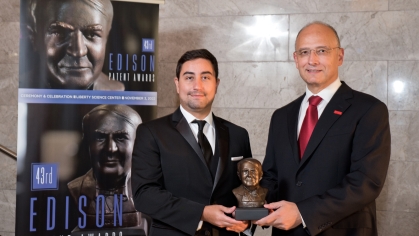SoE Team Receives NSF $3 million Award to Transform Latency-critical Manufacturing for Future Smart Factories

The National Science Foundation (NSF) has awarded Rutgers Engineering researchers nearly $3 million for a four-year project to develop “NextG-Enabled Manufacturing (NextGEM) of the Future” – one of five prestigious “Future Manufacturing” grants awarded in 2023 – aimed at improving advanced manufacturing efficiencies.
The cross-disciplinary School of Engineering (SoE) team is led by PI Yuebin Guo, Henry Rutgers Professor of Advanced Manufacturing, who will be overseeing all aspects of the project from startup and planning to program implementation and administration, research, and fiscal components.
Team members include Rutgers’ Wireless Information and Network Laboratory (WINLAB) Chief Technologist Ivan Seskar, acting director Narayan Mandayam, and associate director Yingying Chen, all electrical and computer engineering (ECE) faculty, Prof. Jingang Yi of mechanical and aerospace engineering (MAE), and associate professor Weihong (Grace) of industrial systems.
Reshaping the Latency-critical Manufacturing Landscape
For latency-critical manufacturing processes, operation efficiency, quality control, and safety depend on effective timing control. This is why PI Yuebin Guo says that “The overarching goal of the NextGEM project is to empower latency-critical manufacturing by leveraging NextG wireless communications technologies.”
He adds, “Future smart manufacturing should be flexible, versatile, scalable, modular, and plug-and-play in contrast to the conventional static sequential manufacturing paradigm.”
He predicts that 5G and future 6G (NextG) wireless communication will transform smart manufacturing by creating a NextGEM research framework; an open-access Next GEM cyberinfrastructure; facilitating education and workforce development to grow next generation talent; and forming a public-private innovation ecosystem with stakeholders to advance knowledge and develop enabling technologies for a range of US industries.
A Broad Range of Applications
As acting director of WINLAB, Mandayam is working with WINLAB colleagues Chen and Seskar on designing NextG wireless infrastructure able to support new advanced manufacturing research and applications.
“What I find exciting is the focus on a specific vertical – namely manufacturing – and the interdisciplinary effort between School of Engineering wireless networking researchers and mechanical engineers,” he remarks.
According to Mandayam, successful execution of the project will enable tetherless advanced manufacturing at scale, while also advancing wireless network design principles for other verticals such as smart healthcare and automated driving that require low latency and high throughput networking support.
Co-PI Grace Guo , who is leading the development of the project’s sustainable cyberinfrastructure and its education and workforce development component, believes that the project will ultimately improve operation efficiencies with fewer defects, while driving growth with new business models.
“The 5G revolution will create 4.5 million 5G-related new jobs through 2034. Yet, a diverse 5G-savvy workforce is scarce,” she says.
According to PI Guo, by devising a platform to encourage and engage the participation of diverse and underrepresented groups, the project will create and establish the next generation of the digital manufacturing workforce.
“This is critical to ensuring that American manufacturing leadership will be at the forefront of Industry 4.0 economic growth and prosperity,” he maintains.


